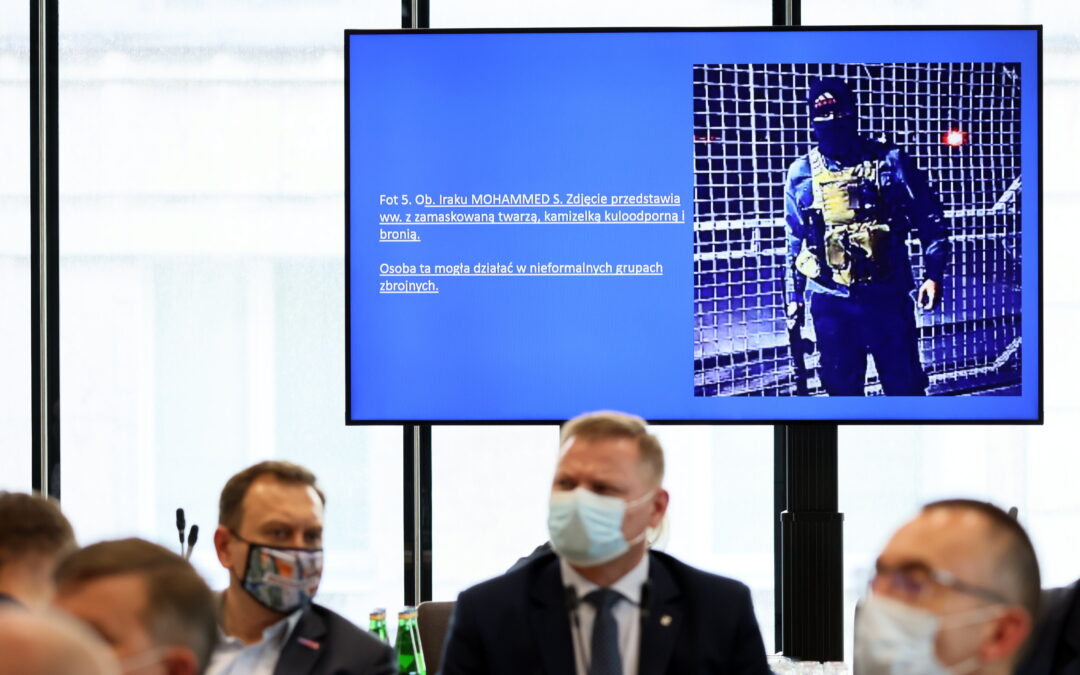Poland’s interior minister, Mariusz Kamiński, has announced that he is seeking to extend the state of emergency that is in place on the border with Belarus amid an ongoing surge in crossings by migrants from Africa, Asia and the Middle East.
Kamiński revealed that around 1,200 illegal border crossers are currently being held in Poland, with thousands more having been prevented from crossing since August. During his press conference, he also showed terrorist material taken from some of their phones, as well as pornography involving animals and children.
His announcements came as a new poll revealed that a majority of the Polish public support extending the state of emergency, which was introduced at the start of September. However, most also want it to no longer include a ban on journalists entering the border area.
Kamiński’s declaration today followed media reports this morning indicating that the government, which must request the extension, and the president, who must approve it, were in favour of doing so. Subsequently, the prime minister, Mateusz Morawiecki, said he had added the issue to the agenda of tomorrow’s cabinet meeting.
“The situation is tense; there are a number of incidents involving officers of the uniformed Belarusian services”, said Kamiński, quoted by Wprost. “We are not talking about refugee movements, we are talking about politically motivated mass migration.”
Poland, the Baltic states and the European Commission have repeatedly condemned Belarusian dictator Alexander Lukashenko for orchestrating the passage of migrants first to Belarus, and then across its borders into the EU.
Amid a surge in crossings over the border from Belarus, Poland has published photos from the phones of people detained
It says these prove they "come as tourists" to Minsk and are then helped to illegally cross into the EU https://t.co/AlpjtJFqDA
— Notes from Poland 🇵🇱 (@notesfrompoland) September 24, 2021
Since the start of August, Polish authorities have recorded around 9,400 attempted crossings. By contrast, in the whole of last year, the figure was 120. Noting that 1,200 people were now being detained in closed centres, Kamiński said that “many have no documents, many have false documents”.
“Currently information [gathered shows] that one in four people [has] dangerous connections and participated in unlawful practices,” added Stanisław Żaryn, spokesman for Poland’s security services. “One in ten has possible connections with terrorist organisations, criminal activity, people smuggling, as well as forging of documents.”
At their press conference, the officials showed images of messages and photographs taken from the phones of some of those detained. One Iraqi citizen had contact with an explosives and weapons specialist linked to Islamic State, said Żaryn, cited by Onet.
Other evidence collected from the devices of border crossers showed executions by decapitation, military training, and links to Russia, said the ministers. On screen, they also displayed images showing pornography involving animals and children that were allegedly among many found in the possession of one Afghan man.
Wstrząsająca konferencja @MSWiA_GOV_PL @MON_GOV_PL i @Straz_Graniczna na temat ustalonych danych na temat niektórych imigrantów, którzy przedostali się nielegalnie do PL z Białorusi. W telefonach: egzekucje, terroryzm, pedofilia, zoofilia, związki z Rosją. pic.twitter.com/iQ8RGlTMfg
— Bartosz Lewandowski (@BartoszLewand20) September 27, 2021
“Political correctness dictates not to talk about it, but we put the security of our homeland above all else, which is why we present these materials showing that those who are storming our borders have contacts with terrorist groups and pose a threat to Poland,” said the defence minister, Mariusz Błaszczak.
The current state of emergency, which was introduced on 2 September, lasts for 30 days. It can be extended once, for a period of up to 60 days.
In an IBRiS poll for Rzeczpospolita published today, a narrow majority (52.6%) of the public were in favour of extending it “until the migrant/refugee problem is solved”. Just over a third (36.3%) instead said it should be ended “as soon as possible”.
However, in a separate Ipsos poll, 59% said that it was “not a good thing” that journalists have been banned from visiting the border under the state of emergency. Meanwhile, 35% said that it was good (a figure that jumped to 78% among supporters of the ruling party).
A video report on the BBC News front page includes claims that Polish forces are illegally pushing migrants back over the border to Belarus. It also expresses concerns that "the world isn't getting to know what's happening" in the closed border zone. https://t.co/2ObBxozH6E
— Stanley Bill (@StanleySBill) September 24, 2021
The ban on non-resident civilians from visiting the area has made independent verification of what is happening there difficult. However, as the weather has recently worsened, it is clear that conditions have become more treacherous for the border crossers.
Last week, five dead bodies were found on the Polish side of the border. Today, a Polish NGO claimed that a 16-year-old Iraqi who was part of a group pushed back over the border by Poland’s border guard had subsequently died, reports Onet.
The Polish authorities have faced accusations from human rights groups of illegitimately denying asylum seekers entry to Poland, and in some cases of illegally pushing them back over the border. Multiple reports have indicated that Belarusian security services act violently towards the migrants.
On Friday, a group of 21 doctors in Poland applied to the interior ministry to be allowed into the emergency zone in order to provide medical treatment to border crossers. Today the interior ministry responded that the request was unnecessary as Poland already provides medical care to those who need it.
Main image credit: Slawomir Kaminski / Agencja Gazeta

Maria Wilczek is deputy editor of Notes from Poland. She is a regular writer for The Times, The Economist and Al Jazeera English, and has also featured in Foreign Policy, Politico Europe, The Spectator and Gazeta Wyborcza.




















